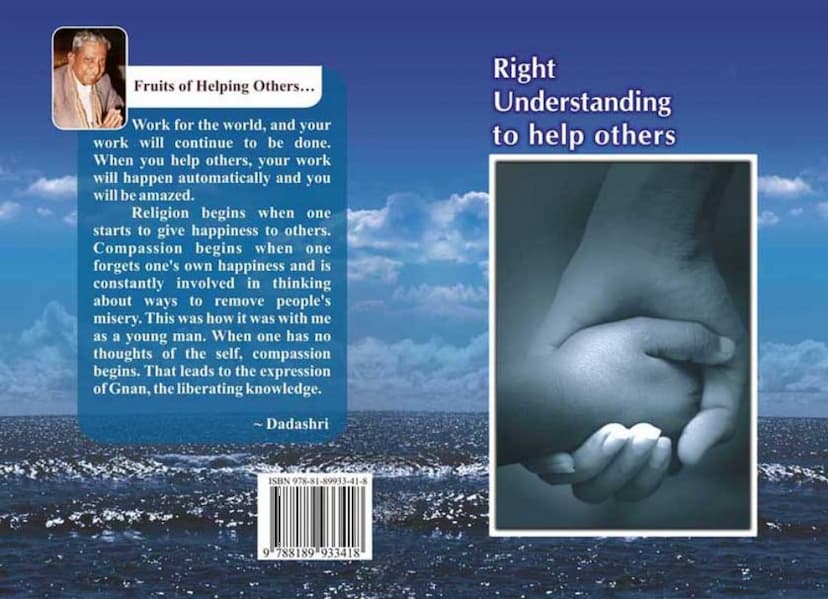Right Understanding To Help Others
Added to library: September 2, 2025

Summary
The book "Right Understanding to Help Others" by Dada Bhagwan, published by Mahavideh Foundation, expounds on the spiritual significance and practical application of helping others as a path to happiness, spiritual progress, and ultimately, liberation. The core message emphasizes that true religion and happiness begin when one dedicates oneself to the well-being of others, often by transcending self-interest and seeking to alleviate the suffering of others.
Here's a comprehensive summary of the key themes and teachings presented in the book:
1. The Fruits of Helping Others:
- Automatic Work and Amazement: When you work for the world and help others, your own tasks will be accomplished automatically, leading to a sense of amazement.
- Beginning of Religion and Compassion: Religion, in its truest sense, starts when one brings happiness to others. Compassion arises when one forgets their own happiness to focus on removing the misery of others. This selfless concern for others is the foundation for liberating knowledge.
2. The Special Importance of Human Life:
- Purpose of Life: The human life is precious and intended for service to others and the attainment of Self-realization (liberation).
- Inner Intent (Bhaav): While external actions are important, the inner intent (bhaav) behind them is crucial. A pure intention to help others will yield positive results.
- Benevolence and Service: The book stresses that life is meant for practicing benevolence and serving others. Using one's mind, speech, and body for the benefit of others ensures that all needs are met and leads to eventual liberation.
3. Helping Others Without Judgment or Conditions:
- Non-Judgmental Service: True helpers are not concerned with whether the people they help appreciate or understand their actions. Judging others prevents true service.
- The Mango Tree Analogy: The book frequently uses the analogy of a mango tree that offers its fruits to everyone without discrimination. The tree's life is dedicated to serving others, and in return, it progresses to higher life forms. Humans are encouraged to emulate this selfless giving.
- Gratitude and Ingratitude: Even when facing ingratitude, a benevolent person should continue to serve. Understanding the underlying science of karma helps in accepting these situations.
4. The Two Goals of Life:
- Liberation (Moksha): The ultimate goal of human life is to break the cycle of birth and death and achieve liberation.
- Living for Others (Paropkar): If Self-realization is not immediately attainable, the next best purpose is to live for the benefit of others. This path also leads to spiritual progress.
5. Maintaining an Obliging Nature:
- Ideal and Harmonious Life: An obliging nature, characterized by giving to others, leads to an ideal and harmonious life.
- Internal Intentions: The internal intention to help is more important than external actions. Even if one doesn't have the means to give financially, the intent to help is crucial.
- Religion and Happiness: Religion begins with an obliging nature, and happiness is found in giving to others, not taking.
6. Merit Karma (Punya) and Demerit Karma (Paap):
- Friend and Enemy: Merit karma acts as a friend, and demerit karma as an enemy. By helping others, one cultivates merit karma.
- Learning from Nature: Trees and plants serve humans selflessly, demonstrating the principle of merit accumulation.
7. Yog, Upayog, Paropkaray:
- Union, Awareness, and Benevolence: These are presented as principles for those who enjoy worldly life. Yog refers to the union of mind, speech, and body; Upayog is the application of intellect and awareness for others; Paropkaray is benevolence.
8. The Real Method of Obliging:
- Selfless Service: True service is done silently, without seeking recognition or expecting anything in return.
- Intention is Key: The intention behind the service is paramount. If the intention is pure, the act of service becomes effective.
- Avoiding Ego: The ego of doership ("I am doing this") creates bondage. True service is performed without the belief of "I am the doer." When the ego is destroyed, one becomes the absolute Self.
9. Worldly Wealth as a By-product:
- Separate Directions: Pursuing worldly prosperity and spiritual progress are in opposite directions.
- Spiritual Production: Focusing on spiritual activities is the "main production," and worldly wealth becomes a "by-product" that comes automatically. When people make money their primary goal, they miss out on this natural flow.
10. Service to the Self (Atma Dharma):
- Highest Religion: Service to the Self is considered higher than service to the world because it involves not hurting any living being.
- Signs of Service to the Self: This includes not lying, stealing, hoarding, or causing harm. Even when hurt, one should not wish ill upon the other and should bless them.
11. The Ego of Those Who Help Others:
- Normal Ego: The ego of a benevolent person is within normal limits.
- Requesting Forgiveness: When the ego of doership arises, one should ask for forgiveness from the divine within.
12. Service to Parents and Guru:
- Primary Obligation: Serving parents is a fundamental moral duty and brings worldly happiness and peace.
- Gratitude: Deep gratitude is owed to parents and the guru.
- Consequences of Neglect: Neglecting parents leads to unhappiness in this life and potentially unfavorable rebirths.
13. The Essence of Religion:
- Giving Happiness: Religion begins with giving happiness to others.
- True Compassion: True compassion is acting without concern for one's own happiness.
In essence, "Right Understanding to Help Others" is a guide to living a meaningful and spiritually fulfilling life by embodying the principles of selfless service, compassion, and benevolence. It teaches that by focusing on the well-being of others, one not only contributes positively to the world but also paves the way for personal spiritual growth and ultimate liberation.